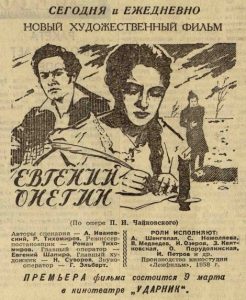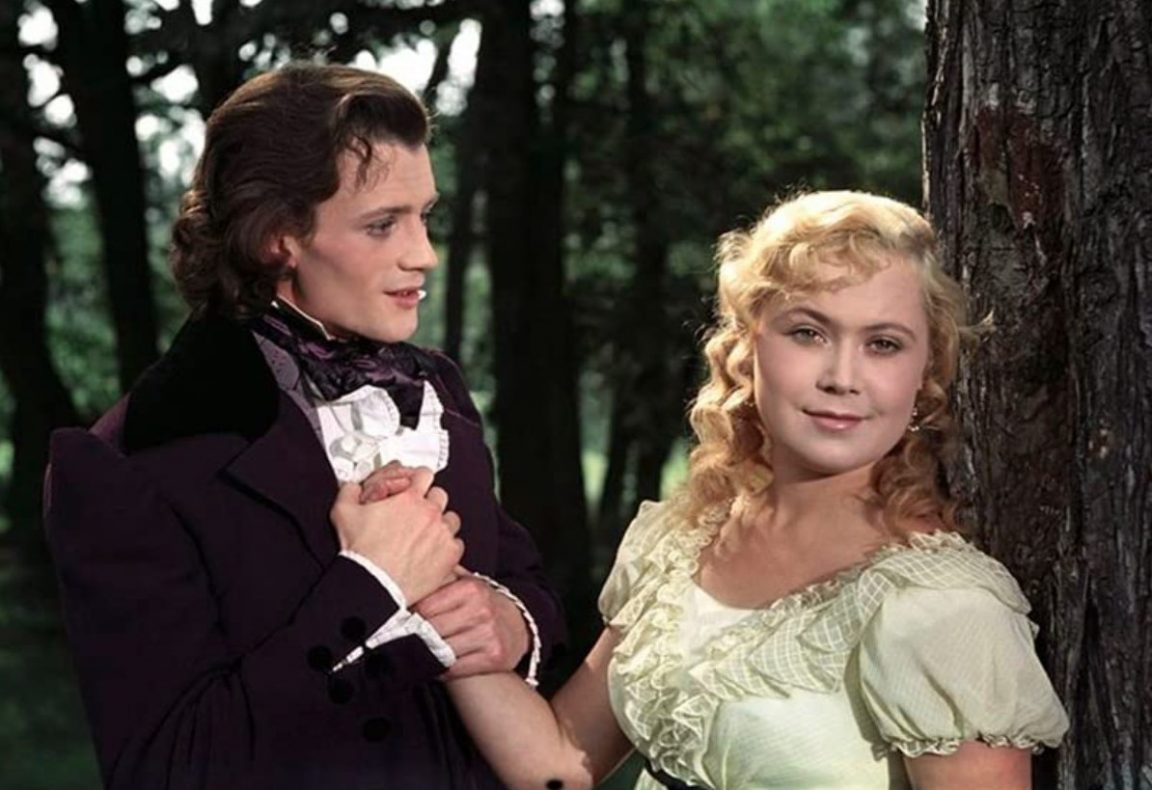The Screen: A Fluid Fusion of Film and Opera; ‘Eugene Onegin,’ From Soviet, at the Cameo
By A. H. Weiler Sept. 14, 1959
IN subscribing to the fact that opera and motion pictures are separate and distinct mediums of expression, the Russian film-makers have turned the surprising trick of coalescing the two into a remarkably edifying whole in «Eugene Onegin.» For this screen version of Tchaikov-sky’s work, which came to the Cameo yesterday, is a fluidly moving film that is almost entirely freed from the constricting confines of the stage.Although it still clings to some of the mannered and static posturings and declamations of the opera, «Eugene Onegin» is still a strong illustration that the unregenerated purists can be wrong and that the arts and mechanics of the movies and lyric theatre may be blended into lifelike, musical and convincing form.Since the eighty-year-old «Eugene Onegin,» which, with «Pique Dame,» is perhaps Tchaikovsky at his operatic best, it would be foolhardy to argue that the story, as taken from Pushkin’s celebrated long poem, is an overly simple, somewhat musty and archaic affair. As a tragic tale of star-crossed lovers and unrequited love, it is better tucked away with the past, along with faded, sachet-scented letters.But the production team at the Lenfilm Studios in Leningrad, as well as the principals, the soloists, choruses, orchestras and dancers of the Bolshoi and Leningrad Theatres, have used color, music and movement to transport Onegin, his beloved Tatiana and their coterie of early eighteenth-century landed aristocracy as far from the proscenium arch as possible.They move about in lush, green meadows and parks studded with silver birch and sparkling lakes, in gracious country houses and in stately St. Petersburg mansions. They sing and dance at vivid sumptuous balls and in pastoral settings of beautiful pastel shades.Credit must go to director Roman Tikhomirov for keeping his cast, his settings and his score in natural alignment. There are few startling changes from one scene to another and his leading players are, for the most part, at ease and untheatrical in their surroundings.Since they obviously were only concerned at achieving a top total effect, the producers wisely synchronized professional voices with the talents of some of the more photogenic Soviet actors. To an untutored ear such soloists as Galina Vishnevskaya, who delivers the dulcet soprano tones of Tatiana; Yevgeni Kibkalo, who sings the Onegin baritone arias, and Anton Grigoriev, as the Lensky tenor, sound as professionally striking as any. The same should be said of the orchestral, choral and ballet contributions, which delight both the eye and ear.Ariadna Shengelaya, as the love-tortured Tatiana, is proof that beauty and ability know no boundaries. The sad brunette is restrained, dignified and believable as the gentle, reflective damsel who never recovers from her first and unfulfilled love.As the manly but unfettered object of her affections, Vadim Medvedev, is a handsome, Byron-like figure, moody, fiery-eyed and passionate, who cannot forget Lensky, the friend he kills in a duel, or the ardor he has for Tatiana. As Lensky, Igor Ozerov is a properly fragile, poetic type, who is seemingly a mite too gentle for the role. Svetlana Nemolyneva is merely buxom, blonde and overly playful as Tatiana’s younger sister, Olga.Although the English subtitles are clear and helpful, they are couched in the mid-Victorian phrases that often make English translations of operatic lyrics sound strange, if not downright stiff. They help, however, to point up the obvious fact that «Eugene Onegin» is, at last, as artistic a film as it is an opera.Also on the program is a fifty-minute documentary in color, titled «Tchaikovsky» and produced by the Central Documentary Film Studio of Moscow. It details simply and often effectively the life of the composer through the scenes of his childhood and adult life and through some of his music. The noted pianists, Sviatoslav Richter, and Van Cliburn, who is seen and heard in a few excerpts, are among the featured performers.
The Cast EUGENE ONEGIN; the opera by Peter Ilich Tchaikovsky based on the poem by Alexander Pushkin; scenario by Alexander Ivanowsky; directed by Roman Tikhomirov; produced by the Lenfilm studios and released here by Artkino Pictures.
At the Cameo Theatre, Eighth Avenue and Forty-fourth Street 13 September 1959. Running time: 105 minutes.
Tatiana . . . . . Ariadna Shengelaya (sung by Galina Vishnevskaya)
Onegin . . . . . Vadim Medvedev (sung by Yevgeni Kibkalo)
Lensky . . . . . Igor Ozerov (sung by Anton Grigorlev)
Olga . . . . . Svetlana Nemolyneva (sung by Larissa Avdeyeva)
Gremin . . . . . Ivan Petrov (sung by Mr. Petrov)
andthe soloists, chorus, corps de ballet and orchestras of the Bolshol Theatre and the Leningrad Theatre of Opera and Ballet.

«Евгений Онегин»
Выпущен на экран:
Soviet Union 8 March 1959
USA 13 September 1959
Finland 6 November 1959
Hungary 19 November 1959
Australia 9 June 1960
Denmark 9 May 1963
| ФИЛЬМОГРАФИЯ ОТЕЧЕСТВЕННЫХ ФИЛЬМОВ |



